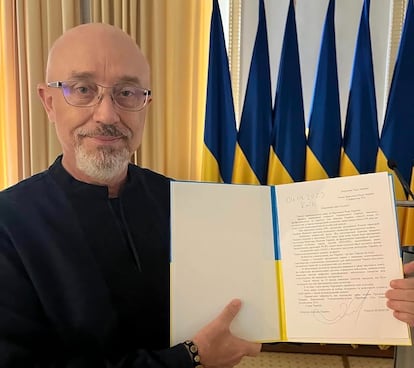Defense Minister Reznikov dismissed as Kyiv brings an end to political ‘soap opera’
President Volodymyr Zelenskiy has fired the head of the Defense portfolio as part of his efforts to combat endemic corruption in the country

The most gripping political soap opera of the war in Ukraine has lasted half a year. The dismissal of Oleksii Reznikov, still acting Minister of Defense, was an open secret since last February, when members of President Volodymyr Zelenskiy’s party assumed that his replacement would be installed at that time. Since then there has not been a month in which the media — and Reznikov himself — has not speculated about the date of his departure. Preparations for the counteroffensive postponed a decision that Zelenskiy had already made, according to his supporters, to demonstrate that the fight against corruption is as important as any fought on the battlefield.
Zelenskiy announced Sunday that he would propose Reznikov’s dismissal to the Ukrainian Parliament, the Rada. The reason, according to the head of state, is that the Ministry of Defense needs a new direction. Reznikov has been a key asset in Ukraine’s strategy for negotiating foreign military aid. A lawyer and career military man during the time of the Soviet Union, his skills in establishing strong personal relationships with his counterparts in NATO member states have been key in the defense of his country. Reznikov, like Zelenskiy, has not missed any opportunity to meet with Western politicians and senior military commanders.
In his farewell letter, in which he confirmed his dismissal before the Rada, Reznikov stressed that in the year and a half of war that he has been at the head of Defense, the Ukrainian Armed Forces have managed to expel the invaders from 50% of the territories they had occupied, from the failed Russian offensive on Kyiv to the liberation of the province of Kharkiv and half of the province of Kherson. But this has not been enough to save his position in office.
A betrayal of the country
A priority for Zelenskiy is to send signals to his citizens and Europe that he is combating Ukraine’s systemic corruption. Since June 2022, the country has been a candidate to join the European Union. Clamping down on corruption, especially by senior state officials, is a non-negotiable priority for entry, the European Commission has stressed. Since last year, Zelenskiy has approved dozens of dismissals linked to wartime corruption cases, and has also strengthened the independence of the Anti-Corruption Prosecutor’s Office and given greater powers to the National Agency for the Prevention of Corruption. Embezzlement scandals are constant, in all areas of public administration, but those linked to the Armed Forces, and the country’s defense budget, carry a significance that the president himself admitted this August when proposing to the Rada that it equated to treason.
In a year and a half, the United States and the countries of the European Union have provided Ukraine with aid valued at more than $175 billion, most of it to its Armed Forces. Kyiv’s allies are increasingly demanding more transparency and the accumulation of information about corruption in the Ministry of Defense was unsustainable. Reznikov is not accused of any irregularity, but he himself has conceded that he is ultimately responsible for what has happened in his ministry. And what has happened has unnerved Ukrainian public opinion.
First it was a million-dollar contract, investigated by justice, for the purchase of food rations for the troops. The contract was signed with inflated prices and with fewer quantities than stipulated. Then there was another scandal over the purchase, supposedly at prices well above the average market cost, of uniforms for the army. Zelenskiy also dismissed all those responsible for the provincial recruitment offices of the Armed Forces in August due to the succession of evidence of bribes paid by thousands of Ukrainian men not to be enlisted.
At the beginning of this year, when more voices were calling for his dismissal, Reznikov was focused on negotiations with Ukraine’s allied countries to provide a new phase of weapons that would allow the current counteroffensive against Russian defenses to be launched with guarantees. Being dismissed then would have meant a major setback for Ukrainian military operations on the front.
The Ministry of Defense and the Ukrainian Armed Forces are not the only sources of corruption linked to the money that is essential for the country to invest in order to defend itself from the Russian invasion. Last February, Zelenskiy relieved the leadership of the border control department for irregularities detected in the customs service. “The situation has only gotten worse during the war,” said Danilo Hermantsev, deputy of the Servant of the People, Zelenskiy’s party, and head of the parliamentary committee on finance, taxes and tariffs. In the last year, EL PAÍS has received several complaints from aid donors to the army about alleged demands for bribes at the border to accelerate the process of importing essential materiel to be used for the defense of the country, be it off-road vehicles or non-standard equipment.
Sources from the United States government and a Foreign Ministry of an EU member state have explained to this newspaper in recent days that they are strengthening their alternative information network in Kyiv to monitor the destination of the aid that they supply to Ukraine.
Zelenskiy has confirmed that his hardcore is studying the feasibility of calling presidential and legislative elections in 2024. The president’s term ends next March and the elections for the Rada should be held this October. The Constitution and martial law prohibit elections in time of war, but Zelenskiy’s trusted men, such as the Speaker of Parliament Ruslan Stefanchuk, have assumed that a legal reform will be proposed to make the election possible. Trusted Ukrainian media outlets such as Pravda and Telegraf, in addition to experts consulted this August by EL PAÍS, have stated that the main reason for calling Ukrainians to the polls is the progressive decline in popularity of Zelenskiy and his party. As explained by Mark Savchuk, advisor to the National Anti-Corruption Office, this loss of support has largely to do with the fact that the electorate does not see that the profound reforms that the president promised to democratize and cleanse the country of corruption are being implemented.
Reznikov’s fall from grace is understood in this context. Several Ukrainian media outlets have suggested that he could be appointed Ukraine’s ambassador to the United Kingdom. Six months ago, when it was reported from Zelenskiy’s party that Reznikov’s days were numbered, there was speculation that he would be put in charge of a new Ministry of Armaments.
His successor as chief of Defense is Rustem Umerov, a Muslim Tatar from Crimea and, until now, head of the State Property Fund of Ukraine and one of the main negotiators of the exchange of prisoners of war with Russia. In addition to Umerov’s proximity to Zelenskiy, Umerov’s appointment has to do with Ukrainian political power defending the Crimean Tatars (a native ethnic group) as opponents of the Russian occupation of the Black Sea peninsula and as an example of respect for the diversity of nationalities living in Ukraine required by the EU to begin accession negotiations.
Sign up for our weekly newsletter to get more English-language news coverage from EL PAÍS USA Edition
Tu suscripción se está usando en otro dispositivo
¿Quieres añadir otro usuario a tu suscripción?
Si continúas leyendo en este dispositivo, no se podrá leer en el otro.
FlechaTu suscripción se está usando en otro dispositivo y solo puedes acceder a EL PAÍS desde un dispositivo a la vez.
Si quieres compartir tu cuenta, cambia tu suscripción a la modalidad Premium, así podrás añadir otro usuario. Cada uno accederá con su propia cuenta de email, lo que os permitirá personalizar vuestra experiencia en EL PAÍS.
¿Tienes una suscripción de empresa? Accede aquí para contratar más cuentas.
En el caso de no saber quién está usando tu cuenta, te recomendamos cambiar tu contraseña aquí.
Si decides continuar compartiendo tu cuenta, este mensaje se mostrará en tu dispositivo y en el de la otra persona que está usando tu cuenta de forma indefinida, afectando a tu experiencia de lectura. Puedes consultar aquí los términos y condiciones de la suscripción digital.









































